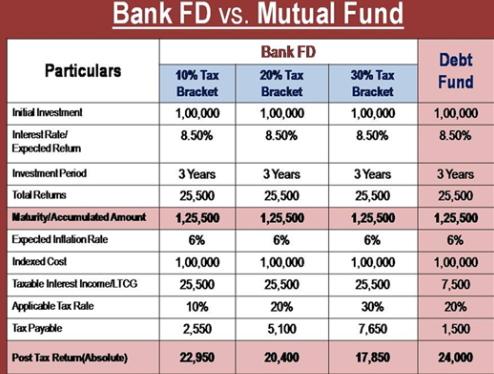
How to Invest Lump-Sum Amount? A Primer on STP
 Shruti Sharma -
Apr 08, 2022
Shruti Sharma -
Apr 08, 2022
Because of the inherent hazards associated with lump sum investments, investors are hesitant to invest big amount in one-go. To reduce risk, financial professionals advise using Systematic Transfer Plans (STP). Also, there are investors, esp. businessmen, who find it difficult to maintain certain balance for auto-debit of SIP on specific dates.
For example, if you've just sold an automobile for INR 3,50,000 in net proceeds. You want to put this money into equities funds, but you're worried about market volatility. As a result, you put the entire sum into a liquid fund. Then you begin investing INR 35,000 each month for a period of ten months in equities funds. STP refers to the process of moving funds from one scheme to another; the balance in liquid funds decreases, while the balance in equity funds increases.
“In STP, people can earn more returns as compared to SIP sourced from savings bank accounts. It is because for an STP, you will be initially investing the lump sum in a debt fund, which provides higher returns as compared to savings bank account.”
Types of STP
Fixed STP: In fixed STP, individuals transfer a fixed sum of money to the target Mutual Fund scheme. This STP amount is decided at the beginning of the investment, like in above example.
Capital Appreciation: In this category of Systematic Transfer Plan, individuals transfer the profits or income generated from the first scheme is transferred to the target Mutual Fund. In this type, investors can ensure that their principal portion remains safe.
Flexi STP: Under flexi STP, people can transfer variable amount from an existing scheme to a target scheme based on need or judgement. For example, if the correction phase of markets; people can invest more in the target scheme to take advantage of falling prices. On the contrary, in case of increasing prices, people can invest the regular minimum amount.
STP Vs SIP
Though SIP and STP sound the same there still exist some differences between them. In case of a SIP, the money is invested from the investor’s bank account to the target Mutual Fund scheme. On the contrary, in case of STP, the investor’s money is transferred from one Mutual Fund scheme (probably debt fund) to the target Mutual Fund scheme (Equity Fund). Therefore, there exists a difference in the source of funds from where the money is coming. Also, in STP, people can earn more returns as the money is invested in debt funds as compared to SIP, where money is in bank accounts. It is because, for an STP, you will be initially investing the lump sum in a debt fund like a liquid fund. Liquid funds are known to yield higher returns in the range of 7%-8% as compared to the mere 3.5% returns earned in a savings bank account. (Returns are indicative only)
Also read; “Wealth Management Around 40s - Actions to Make it Better” https://investocafe.com/blogs/blog_detail/wealth-management-around-40s-actions-to-make-it-better
Things to Remember While Investing via STP
• Go for STP only if you have a lump sum amount to invest which you might not need in the immediate future.
• Though the fund house decides the minimum investment, you need to make at least six STPs as per the SEBI norms.
• STP is one of the most reliable risk-reducing strategies that investors can adopt. However, inherent risk of market is always there.
• This method requires discipline. Suppose, if you opt-out of a plan just because there is a market fluctuation or change in the rates, then the purpose behind opting for it will be defeated.
• Always keep an eye on the underlying assets and their phases. For instance, it would be irrational to transfer capital, when the market is moving to the peak.
In short, STP is a useful strategy to manage risks without affecting your returns significantly. Investocafe offers handpicked funds from the top fund houses in the country. If you want to invest through a systematic transfer plan, then you can choose any plan that suit your requirements or contact us to resolve doubts.
Seek professional help if need be; Contact Investocafe to avail in-depth details about wealth management & investment funds.
Know your risk profile at https://investocafe.com/
Contact Us @ 7224051610 or write at info@investocafe.com
5 Financial Mistakes while Investing for Children
Read Now https://investocafe.com/blogs/blog_detail/5-mistakes-while-investing-for-children
To get in touch please visit us at investocafe.com












